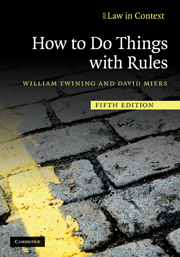Book contents
- Frontmatter
- Contents
- Preface
- Online appendices
- Acknowledgements
- Abbreviations
- Table of statutes and legislative instruments
- Table of cases
- Part I
- Part II Reading, using and interpreting rules in general
- Part III Reading law: reading, using and interpreting legislation and cases
- Part IV
- Index
- Resources on the web
- Appendix I Supplementary materials and exercises on Chapter 1
- Appendix II Normative and legal pluralism
- Appendix III Visual presentation of rules
- Appendix IV The Reading Law Cookbook
- Appendix V Supplementary materials and exercises on Chapters 7–10
- Appendix VI Supplementary materials and exercises on Chapters 9 and 11
- Appendix VII Domestic violence: a case study
- Appendix VIII MPs' expenses: a case study
- Appendix IX Hunting Act 2004: a case study
Appendix VIII - MPs' expenses: a case study
Published online by Cambridge University Press: 05 June 2012
- Frontmatter
- Contents
- Preface
- Online appendices
- Acknowledgements
- Abbreviations
- Table of statutes and legislative instruments
- Table of cases
- Part I
- Part II Reading, using and interpreting rules in general
- Part III Reading law: reading, using and interpreting legislation and cases
- Part IV
- Index
- Resources on the web
- Appendix I Supplementary materials and exercises on Chapter 1
- Appendix II Normative and legal pluralism
- Appendix III Visual presentation of rules
- Appendix IV The Reading Law Cookbook
- Appendix V Supplementary materials and exercises on Chapters 7–10
- Appendix VI Supplementary materials and exercises on Chapters 9 and 11
- Appendix VII Domestic violence: a case study
- Appendix VIII MPs' expenses: a case study
- Appendix IX Hunting Act 2004: a case study
Summary
Introduction
During May and June 2009 the Daily Telegraph, a national newspaper, published details of the expenses claims made by a large number of sitting Members of Parliament. These disclosed what that newspaper, many other commentators and large sections of the public considered were in many cases an abuse of the expenses reimbursement rules managed by the House of Commons. Among other consequences, these disclosures resulted in the (forced) declaration by a number of MPs that they would not stand for re-election, the resignation of the Speaker of the House of Commons, inquiries by the Parliamentary Standards Commissioner into excessive claims, a specially appointed audit review, an independent committee inquiry to devise new claims rules and an Act of Parliament establishing an independent body to oversee claims and repayments.
These events and the official and unofficial responses to them raised a number of issues that are relevant to themes discussed in this book. In this Appendix we first summarize the events. The subheading sections are presented in bold italics. The next section identifies those themes and refers to those chapters where they are of particular relevance. The final section contains some questions and exercises. The facts recounted below are drawn from a range of sources, including parliamentary debates, official reports and accounts drawn from The Times newspaper. The official responses noted in section 2 summarize the position that had developed by 1 January 2010.
- Type
- Chapter
- Information
- How to Do Things with Rules , pp. 526 - 539Publisher: Cambridge University PressPrint publication year: 2010

